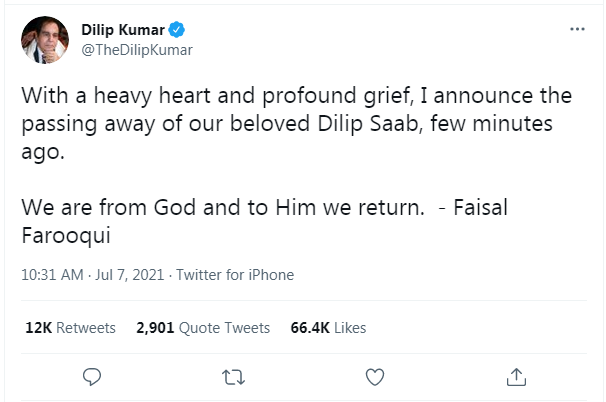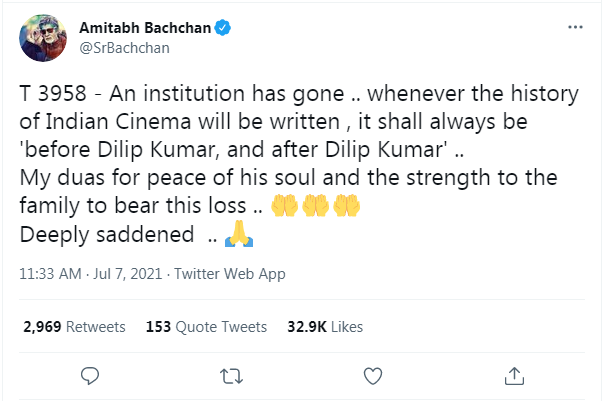Bollywood icon Dilip Kumar, hailed as the "Tragedy King" and one of the Hindi cinema's greatest actors, died Wednesday in a Mumbai hospital after a prolonged illness. He was 98.
The "Tragedy King" title came from Kumar's numerous serious roles. In several, his character died as a frustrated lover and a drunkard. He was also known as Bollywood's only Method actor for his expressive performances identifying a character's emotions.
Kumar was hospitalized twice last month after he complained of breathlessness. The actor's family announced his death "with a heavy heart and profound grief" on Twitter.

A screenshot of a tweet posted by Dilip Kumar's family announcing the actor's passing away on July 7, 2021.
A screenshot of a tweet posted by Dilip Kumar's family announcing the actor's passing away on July 7, 2021.
"Dilip Kumar will be remembered as a cinematic legend. He was blessed with unparalleled brilliance, due to which audiences across generations were enthralled. His passing away is a loss to our cultural world," Indian Prime Minister Narendra Modi said in a tweet that also offered his condolences to Kumar's family and admirers.
"An institution has gone," Bollywood superstar Amitabh Bachchan tweeted. "Whenever the history of Indian Cinema will be written, it shall always be 'before Dilip Kumar, and after Dilip Kumar'.."
"It's the end of an era," filmmaker Madhur Bhandarkar said.

A screenshot of a tweet posted by Indian actor Amitabh Bachchan on July 7, 2021.
A screenshot of a tweet posted by Indian actor Amitabh Bachchan on July 7, 2021.
Kumar's career spanned over six decades with over 60 films. His first major box-office hits were "Jugnu," or "Firefly," in 1947 in which he starred alongside Noor Jehan, and the 1948 film "Shaheed," or "Martyr."
He played a variety of characters – a romantic hero in "Andaz" (1949), a swashbuckler in "Aan" (1952), a dramatic drunkard in "Devdas" (1955), a comic role in "Azaad" (1955), a Muslim prince in the historical epic "Mughal-e-Azam" (1960) and a robber in the social movie "Ganga Jamuna" (1961).
In 1994, he was given the Dadasaheb Phalke Award – the highest honor for contributions to Indian cinema. He also served in the upper house of Indian Parliament after being nominated for a six-year term.
(Cover: File photo of Bollywood star Dilip Kumar smiling after receiving a lifetime achievement award during the 54th National Film Awards ceremony in New Delhi, India, September 2, 2008. /Reuters)
Source(s): AP

